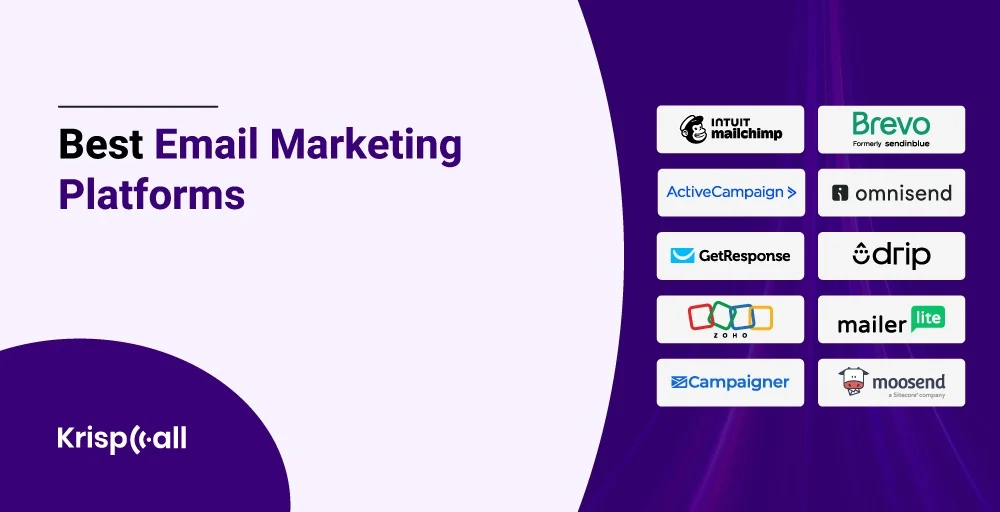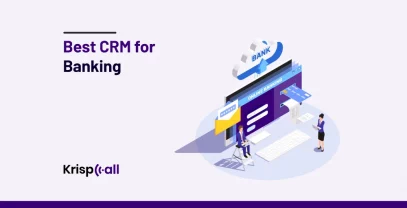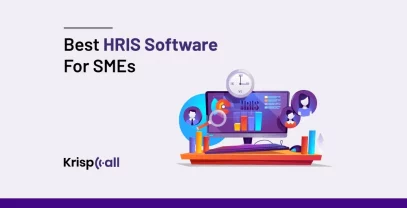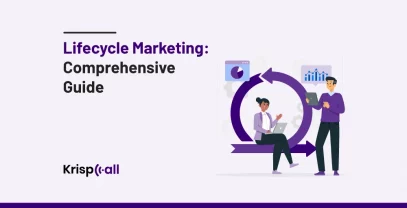In this digital world, email marketing is still one of the most powerful ways businesses connect with customers, boost sales, and attract potential new customers. 🤩
However, with all the different email marketing platforms, figuring out which one to use can be confusing. 🤔
Each platform has its special features, pricing plans, and abilities, making it difficult for companies of all sizes to decide which is the best fit.
Therefore, You need a clear understanding of what each platform offers and how it aligns with your business needs.
In this blog, you’ll learn about the best email marketing platforms for 2024, how to get started with them, and ways to improve your email marketing strategy.
🔑 KEY HIGHLIGHTS
- Email marketing software is a platform that helps automate an organization’s email marketing activities.
- Some factors to consider when choosing the best email marketing software are ease of use, customizations and templates, customer support, pricing, etc.
- Email marketing costs normally less than other forms of marketing or advertisements.
- MailChimp, Brevo, ActiveCampaign, and Omnisend are some of the best email marketing software in 2024.
Top Email Marketing Platforms – At a Glance
| Platforms | Pricing | Key Features | Additional Features | Best For |
| MailChimp | Starts at $13 | Email templates, automation, audience segmentation, analytics | Social media integration, landing pages, A/B testing | Marketing With E-Commerce |
| Brevo | Starts at $9 | Email marketing, SMS campaigns, CRM, automation | Transactional emails, chat, marketing automation | Small Business Marketing Automation |
| ActiveCampaign | Starts at $8 | Email marketing, automation, CRM, sales automation | Advanced reporting, machine learning, site messaging | SMBs Automated Email Marketing |
| Omnisend | Starts at $16 | Email and SMS marketing, automation, segmentation | Pop-ups, product recommendations, A/B testing | E-Commerce Businesses Marketing Solution |
| GetResponse | Starts at $19 | Email marketing, automation, landing pages, webinars | CRM, sales funnels, e-commerce features | SMB and E-Commerce Marketing Automation |
| Drip | Starts at $39 | Email marketing, automation, segmentation, e-commerce CRM | Personalized content, SMS marketing, advanced reporting | E-Commerce Email Marketing Campaigns |
| ZohoCampaigns | Starts at $4 | Email marketing, automation, A/B testing | Social media integration, drag-and-drop editor, templates | Fully Integrated Business Suite |
| MailerLite | Starts at $10 | Email marketing, automation, landing pages, pop-ups | A/B testing, surveys, e-commerce tools | Small Businesses and Startups Email Marketing |
| Campaigner | Starts at $59 | Email marketing, automation, segmentation, SMS marketing | Advanced workflows, dynamic content, A/B testing | Large-sized Business Multi-channel Marketing |
| Moosend | Starts at $5.74 | Email marketing, automation, landing pages, segmentation | Transactional emails, subscription forms, analytics | E-Commerce Businesses |
10 Best Email Marketing Platforms for 2024
1. MailChimp – Best For Marketing With E-Commerce
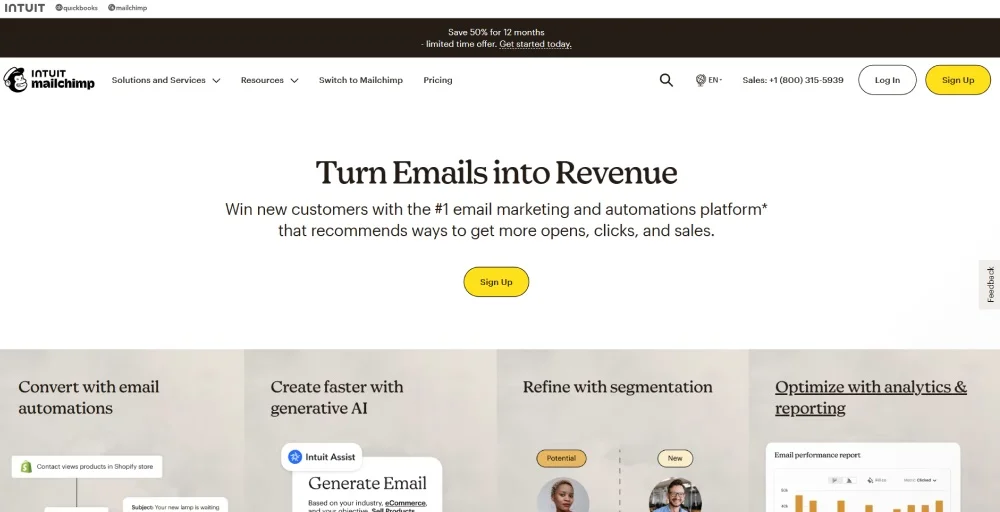
MailChimp is one of the best email marketing platforms available in the market. It was created to help businesses manage their email campaigns effectively. Its powerful features allow email newsletters and campaigns to be easily created, sent and analyzed.
Small and medium-sized enterprises especially like MailChimp because they enjoy its flexibility and scalability. MailChimp can also be used by people who want to create precisely targeted advertising tactics and keep track of their customers.
MailChimp Key Features
- Email Builder.
- Audience Segmentation.
- A/B Testing to optimize email campaigns.
- Automated Marketing Campaigns.
MailChimp Pros & Cons
Pros
- Robust Free Plan.
- Simple and Intuitive Interface.
- Ideal for Beginners.
- Ability to segment contacts.
- Comprehensive Automation.
Cons
- Costly as You Scale.
- Limited Customer Support on Lower Plans.
MailChimp Pricing
| Plan | Price |
| Essential | $13/month |
| Standard | $20/month |
| Premium | $350/month |
2. Brevo- Best For Small Business Marketing Automation
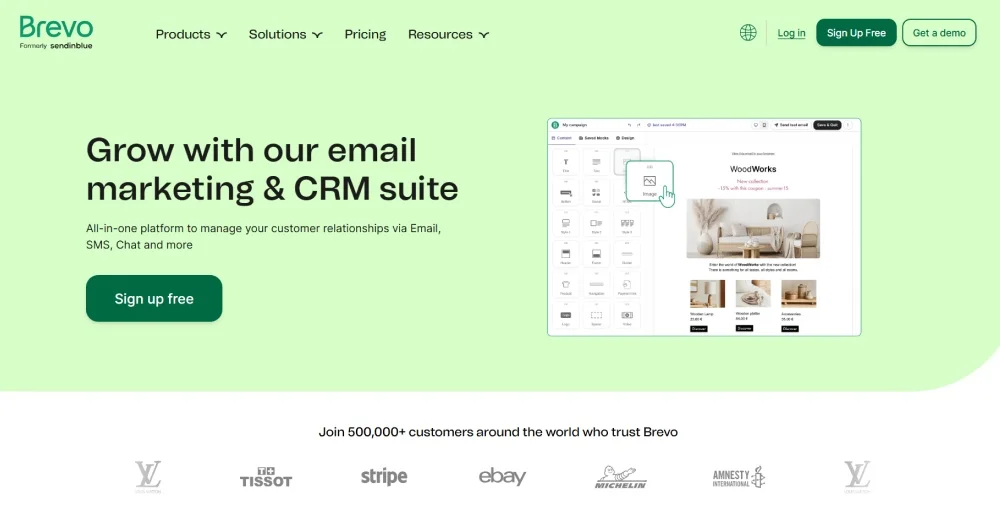
Brevo formerly Sendinblue, is a one-stop-shop marketing solution encompassing chat, email, SMS, CRM, and automation under one roof. It was created for businesses that require effective ways of reaching out to their customers.
Brevo remains a good choice for small organizations that need growing since it is considered a reliable and scalable email marketing platform with sophisticated automation and omnichannel features.
Brevo Key Features
- WhatsApp and SMS Campaigns.
- Powerful marketing automation workflows and triggers.
- Robust email marketing tools with drag-and-drop email builder.
- Contact Segmentation.
Brevo Pros and Cons
Pros
- Simple and easy to use.
- SMS and WhatsApp marketing support.
- Affordable pricing, especially for small businesses.
- Comprehensive email marketing and marketing automation features.
Cons
- Some advanced features may require upgrading to higher-tier plans.
- Some users have reported issues with customer support.
Brevo Pricing
| Plan | Price |
| Starter | $9/month |
| Business | $18/month |
| Enterprise | Custom |
3. ActiveCampaign – Best For SMBs Automated Email Marketing
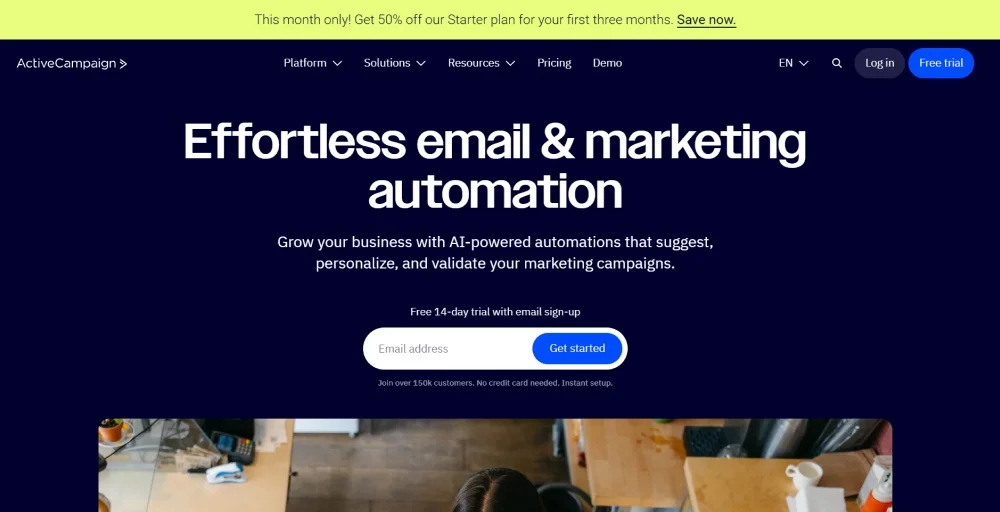
ActiveCampaign is a leading email marketing platform that combines email marketing automation, sales automation, and CRM functionalities. It is well recognized for its high-level automated sequence features and ease-to-use nature. It uses personalized advertising campaigns that aid establishments from any field in establishing long-term customer relations, thus promoting progress.
ActiveCampaign is suitable for businesses of any size that prioritize advanced automation, channel connectivity, and custom-tailored customer experiences. Small companies can use them for audience growth, subscriber participation stimulation, and conversion enhancement.
ActiveCampaign Key Features
- Visual Marketing Automation.
- SMS Campaigns.
- CRM and Sales Automation.
- Track campaign performance and analyze results to optimize future campaigns.
ActiveCampaign Pros and Cons
Pros
- Its Free trial does not require a credit card.
- Unlimited email sending for up to 250,000 contacts in all plans.
- Highly sophisticated automation and personalization capabilities.
- Comprehensive CRM for managing customer data.
Cons
- No free plan.
- Complex than some basic email marketing tools.
ActiveCampaign Pricing
Note: 50% off on the starter plan for the first three months.
| Plan | Price |
| Starter | $8/month |
| Plus | $49/month |
| Pro | $79/month |
| Enterprise | $145/month |
4. Omnisend – Best For E-Commerce Businesses Marketing Solution
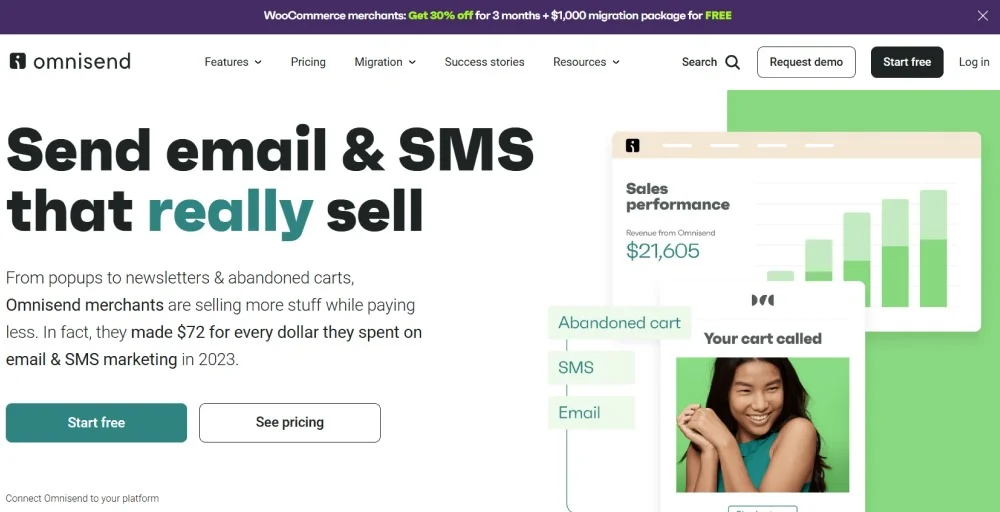
Omnisend enables users to integrate different marketing channels, such as email, SMS, push alerts, and social media, among others, into one platform. It offers an easy-to-use layout, strong automation functionalities, and advanced e-commerce dedicated facilities, including cart recovery emails or product recommendations.
Omnisend is one of the best email marketing software for e-commerce companies of all sizes. It effortlessly enhances customer engagement using personalized suggestions and increases sales through targeted campaigns, lead ads, and automated processes.
Omnisend Key Features
- Email Marketing.
- Multi-Channel Integration.
- Abandoned cart recovery and product recommendation features.
- Advance Reporting and Tracking.
Omnisend Pros and Cons
Pros
- Easy-to-use interface.
- E-commerce-specific features.
- Ability to integrate multiple marketing channels into one platform.
- Personalization capabilities.
Cons
- Can be relatively high for smaller businesses
- Limited customization options for advanced users
Omnisend Pricing
Note: Free plan available.
| Plan | Price |
| Standard | $16/month |
| Pro | $59/month |
5. GetResponse – Best For SMB and E-Commerce Marketing Automation
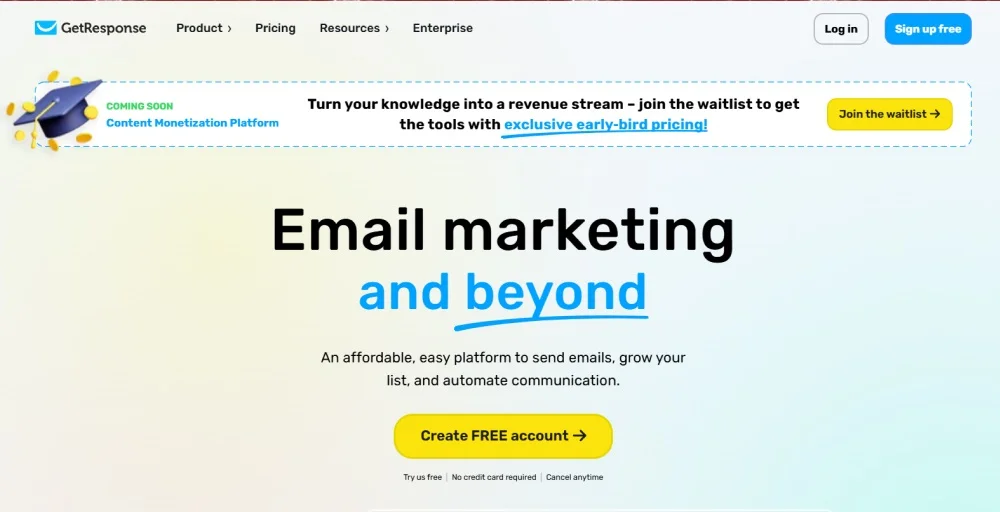
GetResponse is a flexible email marketing platform that includes CRM functionalities, landing pages, webinars, email marketing, and automation in one platform. The software aims to help businesses streamline their marketing efforts and effectively communicate with their audience.
Moreover, GetResponse is useful for any business, regardless of size or industry. It provides every piece of equipment intended to supervise and improve the efficiency of digital marketing in a firm.
GetResponse Key Features
- Marketing Automation.
- Built-in webinar functionality.
- Built-in auditing capabilities, ensuring compliance.
- Tools to create and optimize landing pages with A/B testing capabilities.
GetResponse Pros and Cons
Pros
- Easy email marketing features.
- Comprehensive marketing automation capabilities.
- Improved e-commerce integration.
- Webinar hosting and management functionality.
Cons
- Lacks 24/7 phone support.
- Limited reporting and analytics capabilities.
GetResponse Pricing
Note: Try premium features free of charge for 30 days – no credit card required.
| Plan | Price |
| Email Marketing | $19/month |
| Marketing Automation | $59/month |
| Ecommerce Marketing | $119/month |
6. Drip – Best For E-Commerce Email Marketing Campaigns
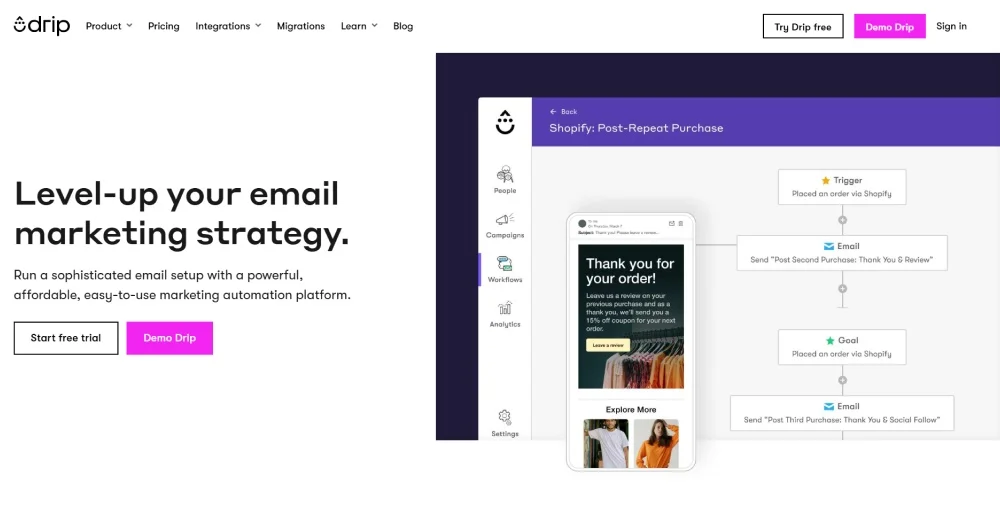
Drip is a sophisticated email marketing tool designed for e-commerce businesses. It offers computerized, personalized email marketing campaigns that can be finely tuned to reflect specific consumers’ actions and desires.
Drip best suits businesses looking for advanced, user-friendly marketing AI outreach tools to increase engagement and sales. It is best known for working with e-commerce firms who like their customer outreach through customization and complex marketing automation.
Drip Key Features
- Advanced Automation.
- Multi-Channel Marketing.
- Segmentation and Personalization.
- E-commerce Integrations.
Drip Pros and Cons
Pros
- User-Friendly Interface.
- Top-tier Automation.
- Numerous Integrations.
- Optional SMS Marketing.
Cons
- Basic Email Templates.
- Limited A/B Testing.
Drip Pricing
Note: Free trial available.
| Plan | Price |
| 2500 people | $39/month |
| 9000 people | $99/month |
| 20,000 people | $289/month |
| More than 1,70,000 people | Custom |
7. Zoho Campaigns- Best For Fully Integrated Business Suite
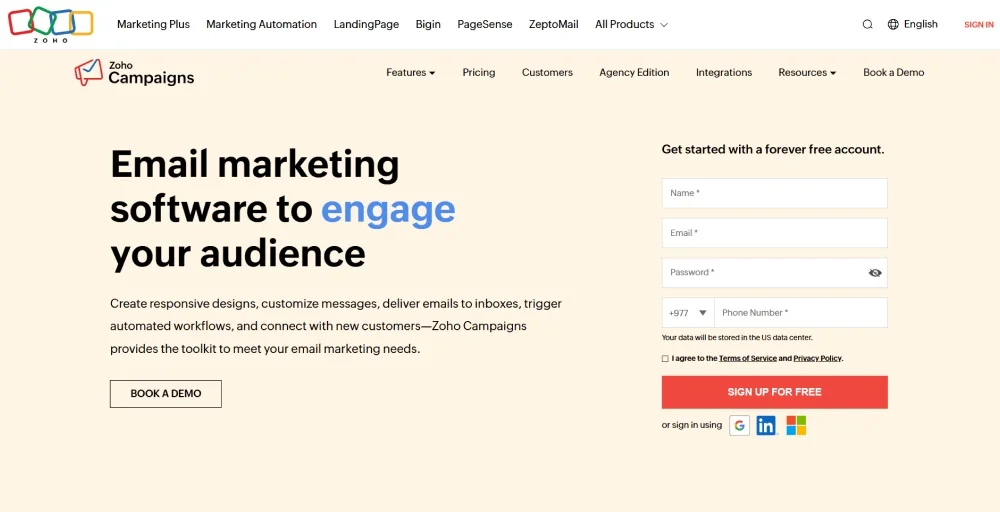
Zoho Campaigns is recommended for vendors who want moderate-sized email marketing solutions at affordable prices. It helps companies reach and communicate with their target audience through functionalities like personalization, automation, delivery optimization, and e-commerce connection.
As part of the wider Zoho ecosystem, Zoho Campaigns can seamlessly integrate with Zoho products, like CRM. Its free plan makes it a cost-effective option for small businesses operating under slim budgets.
Zoho Campaigns Key Features
- Email Automation.
- A/B Testing.
- Drag-and-Drop Editor.
- Integration with Zoho Apps.
Zoho Campaigns Pros and Cons
Pros
- Easy to Use.
- Affordable Pricing.
- Strong integration with other Zoho applications.
- Strong Compliance and Security.
Cons
- Limited Template Options.
- Some users report occasional issues with email deliverability.
Zoho Campaigns Pricing
Note: 14-day free trial. No credit card is required.
| Plan | Price |
|---|---|
| Standard | $4/month |
| Professional | $6/month |
8. MailerLite – Best For Small Businesses and Startups Email Marketing
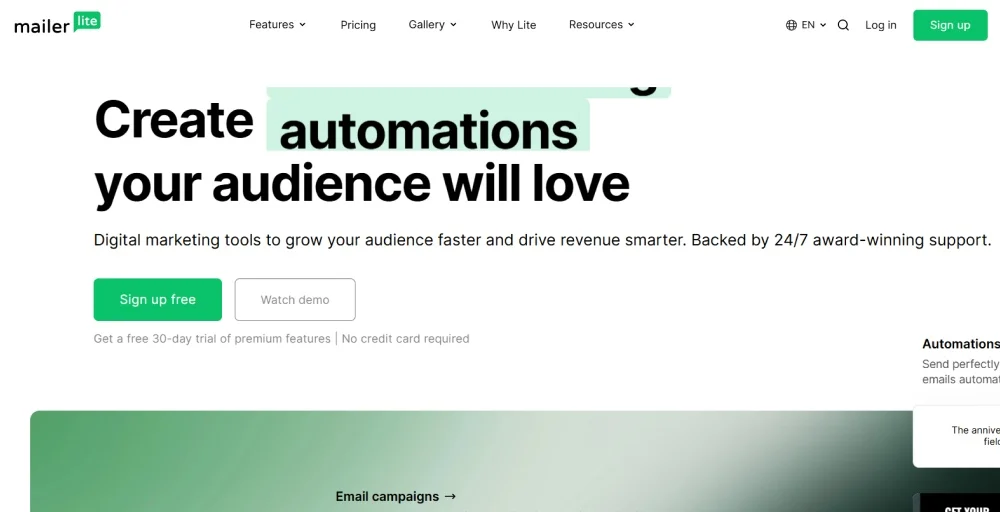
MailerLite lets organizations divide audiences into segments, which enables the targeting of personalized materials at specific groups. It provides tools for creating landing pages that will allow customers to capture leads and grow their mailing lists effectively.
MailerLite is primarily for small and medium-sized businesses looking for a cost-effective, user-friendly solution. Thanks to its vast array of features, It is an ideal email marketing platform for ecommerce campaign development, delivery, and monitoring.
MailerLite Key Features
- Drag-and-Drop Editor.
- Segmentation and Personalization.
- Analytics and Reporting.
- A/B Testing.
MailerLite Pros and Cons
Pros
- Free Plan Available.
- Affordable Pricing.
- Integration with E-commerce Platforms.
- Excellent Customer Support.
Cons
- Limited template customization.
- May lack some advanced features compared to more expensive platforms.
MailerLite Pricing
Note: Get a free 30-day trial of premium features.
| Plan | Price |
| Growing Business | $10/month |
| Advanced | $20/month |
| Enterprise | Contact customer support |
9. Campaigner – Best For Large-sized Business Multi-channel Marketing
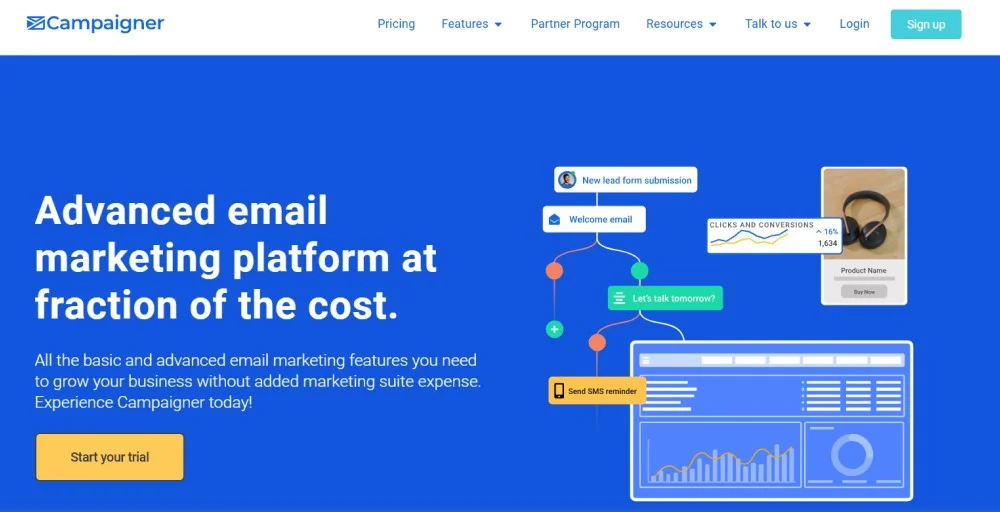
Campaigner is an effective solution for email marketing. This service offers advanced segmentation capabilities, in-depth data, and extensive automation to organizations to assist them in creating very effective and specific email campaigns. With its backing for multi-channel marketing, companies can reach their customers via social media sites, SMS solutions, and emails.
Campaigner is an effective email marketing solution for mid to large-sized enterprises that want sophisticated capabilities and scalability. Due to its vast feature set and ability to scale, Campaigner is ideal for businesses with complex marketing needs and large lists of subscribers.
Campaigner Key Features
- Automate email campaigns.
- Multi-Channel Marketing.
- Sophisticated Segmentation.
- Customize email content dynamically based on recipient data.
Campaigner Pros and Cons
Pros
- Easy to Use.
- Social Media Integration.
- Monitor campaign success with detailed analytics and reports.
- Over 900 templates are available for easy customization..
Cons
- Limited Free Version.
- Reporting features are not as robust as some competitors.
Campaigner Pricing
| Plan | Price |
| Starter | $59/month |
| Essential | $179/month |
| Advanced | $649/month |
| eCommerce | $79.95/month |
10. Moosend – Best For E-Commerce Businesses
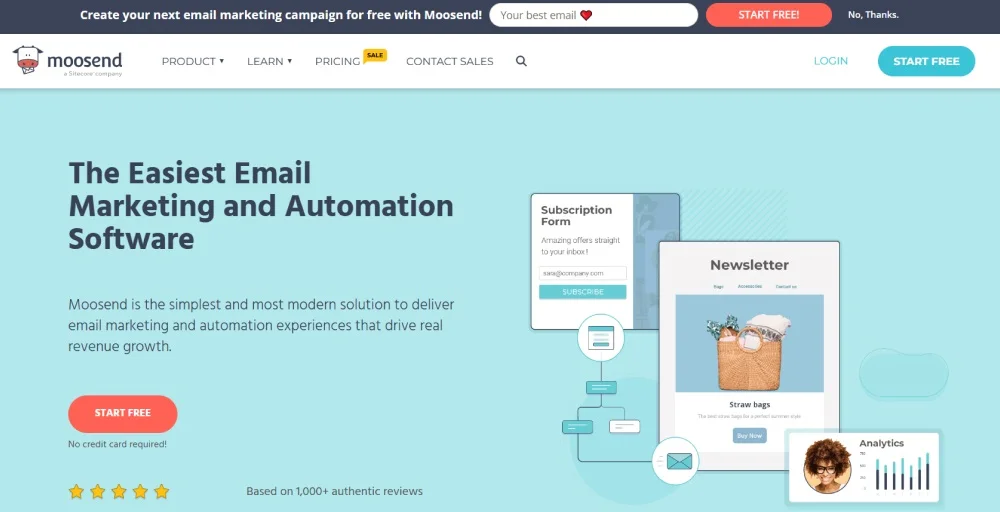
Moosend is an email marketing solution that uses advanced email automation tools to create customized workflows. Its strong analytics and reporting tools help track campaigns’ performance to optimize strategy.
Likewise, Moosend is designed for businesses of every kind (small to medium-sized companies and startups), particularly those that want something advanced and easy to use. The platform has various features that enable you to create, send out, and track email campaigns.
Moosend Key Features
- Drag-and-Drop Email Builder.
- Landing Page Builder.
- Detailed Analytics and Reporting.
- Third-Party Integrations.
Moosend Pros and Cons
Pros
- User-Friendly Interface.
- Affordable Pricing.
- Free trial available.
- Excellent customer support through various channels.
Cons
- Poor Template Library.
- Subscriber-Based Pricing.
Moosend Pricing
Note: 30-day free trial available.
| Plan | Price |
| Pro | $5.74/ month |
| Moosend+ | Custom |
| Enterprise | Custom |
What is Email Marketing Software?
Email marketing software is a platform designed to aid businesses and enterprises in managing and automating their email marketing activities. These applications come equipped with numerous features to make writing, sending, and evaluating messages to clients, subscribers, or target groups more efficient.
How to Choose the Best Email Marketing Software?
You can choose the best email marketing software by considering your team’s needs. Moreover, you can select an affordable platform that offers more than just emailing capability. You need to look for products that can perform all functionalities, such as automating tasks, creating web designs, capturing leads, and developing landing pages, making work much more manageable.
Here are some things you need to consider when choosing the best email marketing software:
- Features: When comparing features offered by various platforms, you should look for features such as automation, segmentation, A/B testing, and interaction with other tools you use.
- Ease of Use: Look for a platform with a simple user interface to help people who know little about technology. So that any user can create, send, and monitor email campaigns easily.
- Customization and Templates: Check if the program allows you to alter designs and create custom emails that match your company’s messaging style.
- Customer Support: Consider the platform’s customer service levels, including how accessible, responsive, and contactable it is (e.g., email, phone, and live chat) in case of any issues or queries.
- Integration: Ensure that your platform seamlessly integrates with your existing systems, such as analytics tools, CRM software, or e-commerce platforms, to simplify operations and data synchronization.
- Pricing: Compare the different price packages based on the amount of money you have to spend, what is being offered, and factors such as the number of subscribers monthly, the number of emails they send per month, and extra features.
- Analytics and Reporting: Select a platform with full analytics and reporting tools to track essential metrics like open rates, click-through rates, conversions, and subscriber engagement.
How to Get Started With Email Marketing?
Starting with email marketing software doesn’t have to be difficult. When it comes to most products’ User Interface (UI)/UX, most people will decide in seconds whether or not they like it. We evaluated several products, and most have free trials to check out before purchase. Luckily, most of these services have clean graphics or clip art paired with good design; hence, they look great even on low-resolution screens.
Some vendors may not provide enough technical support, so make sure you check what they do for technical support. Some offer live chat, email, and phone assistance at all times, while others provide some support only during certain hours, like live chat bars and online documentation. The best services will offer you self service facilities like FAQs or related articles and live support through phone in case of any problem.
Furthermore, consider any issues relating to proof of regulatory compliance. For Europe-targeted customer marketing, it may observe GDPR norms. However, in the US, HIPAA restricts the use of some protected health data in campaigns, whereas marketing regulations for children under eighteen years old are distinct.
If we talk about vendor selection, let them confirm that you know all the rules associated with your organization’s requirements.
How Much Does an Email Marketing Platform Cost?
Email marketing software can cost as little as $0 or as much as $99 per month for a list of 5,000 email contacts if you manage your email campaigns yourself. So, it can be said that email marketing costs less than many other forms of advertising, and the outcome is also good. Though there isn’t much agreement on the average ROI for email marketing, it rates higher out of all the different strategies in online marketing.
Likewise, many email marketing software companies offer unlimited monthly emails or prices based on the number of subscribers. Check for a company with a pay-as-you-go option, an inexpensive one for a few hundred users, or even free for a small list. Some large organizations that need high-volume plans offer bulk subscriptions for a large number of contacts.
How to Improve Your Email Marketing Strategy?
Your methods and strategies may be pivotal in managing successful e-mail advertising campaigns. Consequently, it begins with the tools you use and how you produce and arrange your e-mail list and then goes down to evaluating how the campaign proceeds.
Some of the techniques you must consider to improve your email marketing strategy are:
1. Use Email Marketing Tools
Regular email users are discouraged from using services like Gmail and Microsoft Outlook for email marketing activities. However, Email marketing software simplifies the management of contact lists, lead generation, bulk email delivery, and monitoring. You can use email marketing solutions with various features and integrations with other marketing software, like CRM and landing page creation tools.
2. Build a Targeted Email List
You may have customers’ email addresses after a transaction, but there are other things you can do to increase your list. Whether you sell a physical product, digital item, or service, you can create valuable content to give away for free through their email address. Give people access to webinars, e-books, free trials, discounts, or anything else; this can help you grow the subscribers genuinely interested in what you offer.
3. Segmentation and Personalization
You can send each group-specific and relevant material once you divide your email list into smaller groups based on past purchases, demographics, behavior, etc. Subscriber information can be used to personalize emails by using recipient names, relevant product recommendations, or tailored offers. Open and click-through rates are usually higher on personalized emails.
4. Automate Email Campaigns
Automating your email campaigns allows you to deliver the right message at the right time without manual intervention. This includes creating an automated workflow builder for post-purchase follow-ups, abandoned cart alerts, and welcome emails. Through automation, you can increase the number of email marketing campaigns you undertake, maintain uniformity in communication, and fasten message delivery.
5. Integrate with Other Marketing Channels
Combining your email marketing efforts with other marketing channels, such as social media, websites, and paid advertising, might help create a more cohesive marketing scheme. You should integrate your email marketing platform with CRM software to improve targeting and consolidate client data. Achieving this would increase the connection’s effectiveness and boost the marketing campaigns’ overall effect.
6. Continuously Learn and Adapt
One should review the efficiency of email campaigns regularly to monitor unsubscribe rates, click-throughs, conversions, and open rates. This information can be used to make decisions based on facts instead of just guessing. An example of something that could be different in the emails is A/B testing them to determine which works best. Moreover, Staying updated on industry developments, best practices, and the latest trends in email marketing and adapting accordingly can improve your email marketing strategy.
Conclusion
When choosing an email marketing tool for your business, choosing the tool that best fits your needs is important. For example, if you want a tool with great automation and CRM features, ActiveCampaign might be the best choice. However, if you’re looking for something easy to use with strong features for online stores, Omnisend or Drip could be better options.
Ultimately, the best email marketing software for your business will depend on your specific needs, budget, and what features are important for your marketing goals. By looking at all these factors and understanding what each email platform is good at, you can find the one that will help you get the most out of your email marketing. Therefore, determining which tool works best for your company is key when choosing the right email marketing software.
FAQ
Does Email Marketing Still Work in 2024?
Yes, email marketing still works in 2024. Due to its high ROI, advanced personalization, and direct communication capabilities, email marketing is still highly used.
Why Should I Use Email Marketing?
You should use email marketing because it allows for personalized and targeted communication and provides direct access to your audience.
What are the Different Types of Email Marketing?
The different types of email marketing are promotional emails, transactional emails, newsletter emails, welcome emails, event invitations, and survey emails.
Can Email Marketing Be Integrated with Other Software?
Yes, email marketing can be integrated with other software, such as CRM software, e-commerce platforms, social media, and analytics tools, for enhanced functionality and data synchronization.
What is the Best Email Platform for Marketing?
The best email platform for marketing depends on your specific needs and goals. Popular options are Mailchimp, GetResponse, Omnisend, and Brevo, each offering unique features like automation, segmentation, and analytics.

